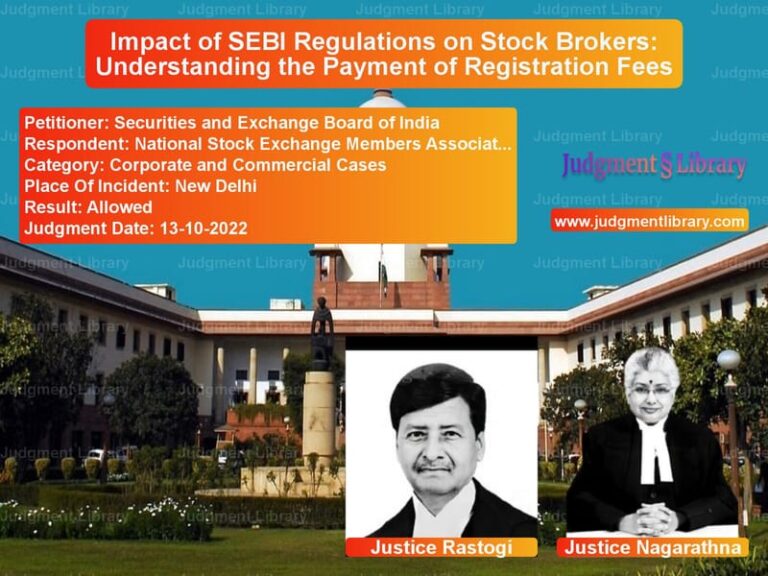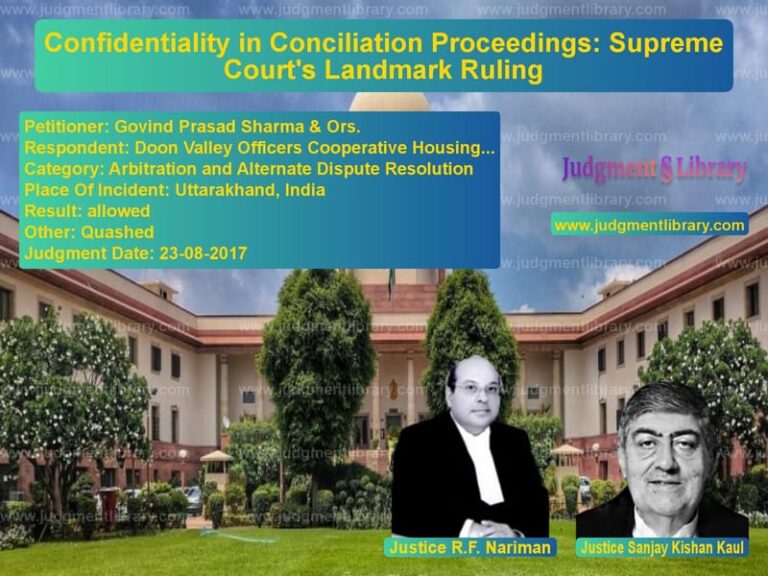Murder Conviction Overturned: Supreme Court Acquits Man Accused of Killing Wife and Daughters
The Supreme Court of India, in the case of Dhal Singh Dewangan vs. State of Chhattisgarh, delivered a landmark judgment acquitting the accused who had been sentenced to death for the murder of his wife and five daughters. The ruling highlighted significant procedural lapses, unreliable witness testimonies, and the failure of the prosecution to establish a conclusive case based on circumstantial evidence.
Background of the Case
Dhal Singh Dewangan was convicted under Section 302 of the Indian Penal Code (IPC) for allegedly murdering his wife and five daughters on February 19, 2012. The trial court sentenced him to death, a decision later upheld by the Chhattisgarh High Court. The case was primarily based on circumstantial evidence, and the prosecution relied heavily on the statements of neighbors and relatives. However, upon appeal, the Supreme Court reviewed the evidence and found that the conviction was not sustainable.
Key Legal Issues
- Was the conviction based on legally admissible evidence?
- Did the prosecution establish guilt beyond a reasonable doubt?
- Were the witness testimonies reliable and admissible?
- Did the accused receive a fair trial?
Arguments Presented in Court
Arguments by the Prosecution:
- The accused was the only male member present in the house on the night of the incident.
- The doors of the house were bolted from inside, making external intrusion unlikely.
- The accused was found unconscious next to the dead bodies, and a blood-stained knife was lying nearby.
- Witnesses, including neighbors and relatives, stated that they had heard the mother of the accused crying that he had murdered his family.
- Forensic reports confirmed the presence of human blood on the accused’s clothes.
Arguments by the Defense:
- The case was entirely based on circumstantial evidence, and there was no direct proof of the accused committing the crime.
- The accused was found unconscious at the scene, and the prosecution failed to establish the reason for his condition.
- Key witnesses gave inconsistent statements, and one of the primary witnesses, the mother of the accused, later retracted her statement.
- The prosecution failed to prove that the doors of the house were locked from inside.
- No fingerprints were collected from the murder weapon to establish that the accused had used it.
Supreme Court’s Observations
The Supreme Court found several inconsistencies in the prosecution’s case and noted that key witness testimonies were unreliable. The Court ruled:
“The prosecution, on the basis of admissible evidence on record, has not proved its case against the appellant. The chain of evidence must be so complete as not to leave any reasonable ground for a conclusion consistent with the innocence of the accused. However, in this case, the prosecution failed to meet that standard.”
The Court also highlighted procedural lapses in the investigation:
“The prosecution did not gather fingerprints from the crime scene, nor did it establish beyond a reasonable doubt that the accused was in a conscious state when the murders took place. The possibility of an alternative hypothesis cannot be ruled out.”
Final Judgment
The Supreme Court overturned the conviction and ordered the immediate release of the accused:
“We allow these appeals, set aside the judgments of conviction and sentence recorded by the Courts below, and acquit the appellant of all charges. The appellant shall be set at liberty immediately unless his custody is required in any other case.”
Implications of the Judgment
This ruling has several critical implications:
- Strengthening the burden of proof in criminal cases: The prosecution must establish guilt beyond reasonable doubt, especially in cases relying on circumstantial evidence.
- Ensuring fair trials: Courts must critically analyze witness testimonies and procedural adherence to prevent wrongful convictions.
- Investigative lapses: The ruling underscores the need for thorough forensic examination and collection of direct evidence.
Conclusion
The Supreme Court’s judgment in Dhal Singh Dewangan vs. State of Chhattisgarh serves as a vital precedent in criminal law, reaffirming that the death penalty cannot be awarded unless guilt is conclusively established. The case highlights the importance of proper investigation and due process to ensure that justice is served fairly and without prejudice.
Don’t miss out on the full details! Download the complete judgment in PDF format below and gain valuable insights instantly!
Download Judgment: Dhal Singh Dewangan vs State of Chhattisgar Supreme Court of India Judgment Dated 23-09-2016-1741883809330.pdf
Direct Downlaod Judgment: Direct downlaod this Judgment
See all petitions in Murder Cases
See all petitions in Judgment by Ranjan Gogoi
See all petitions in Judgment by Uday Umesh Lalit
See all petitions in Judgment by Prafulla C. Pant
See all petitions in allowed
See all petitions in Quashed
See all petitions in supreme court of India judgments September 2016
See all petitions in 2016 judgments
See all posts in Criminal Cases Category
See all allowed petitions in Criminal Cases Category
See all Dismissed petitions in Criminal Cases Category
See all partially allowed petitions in Criminal Cases Category







